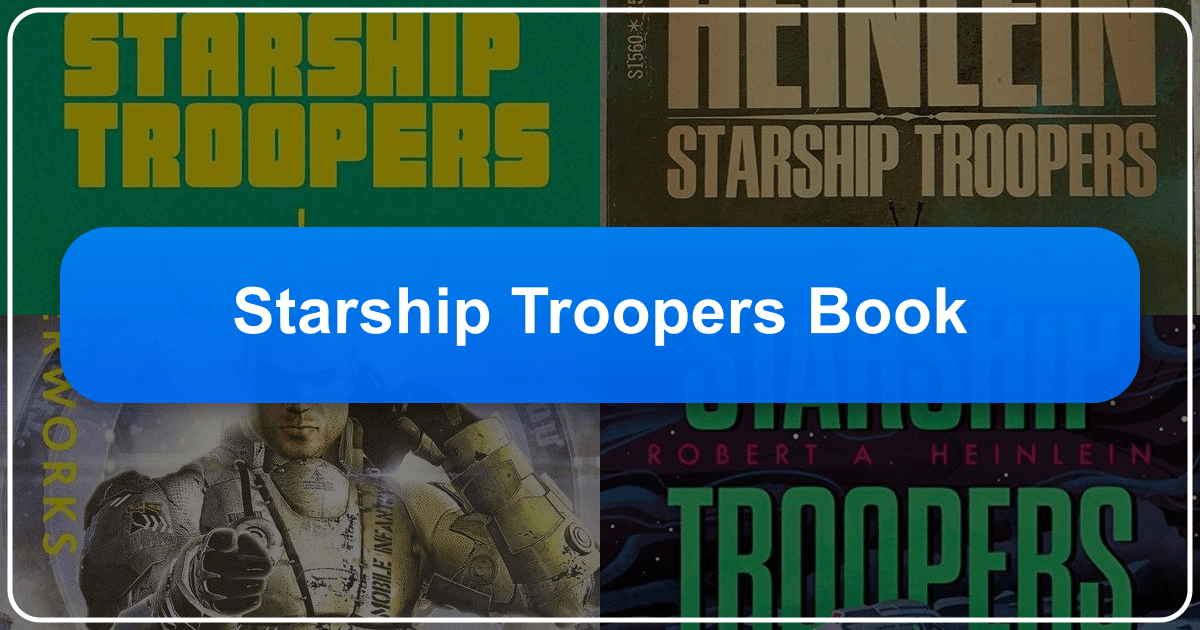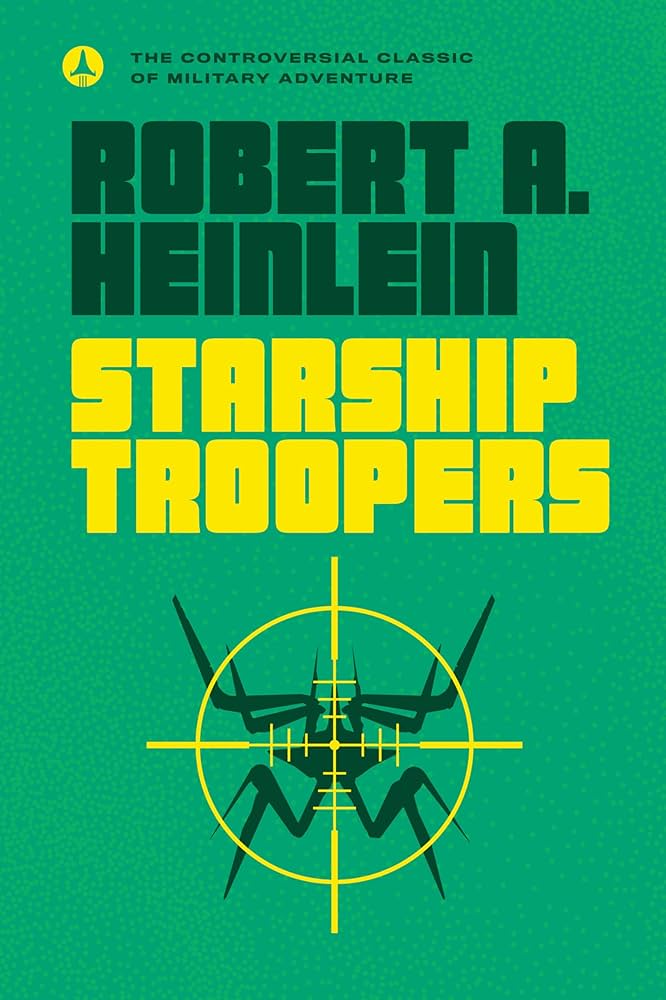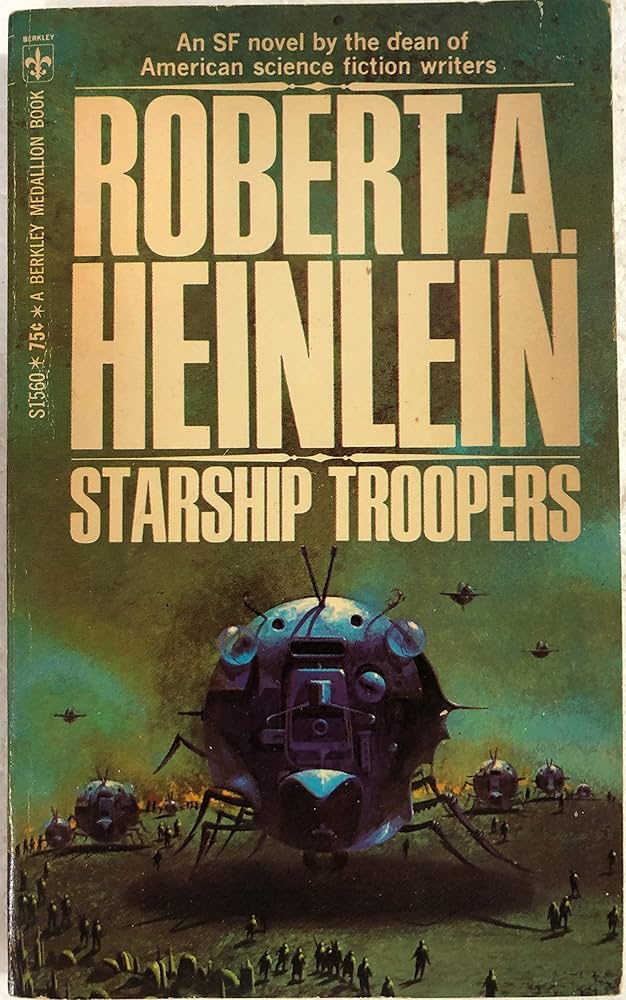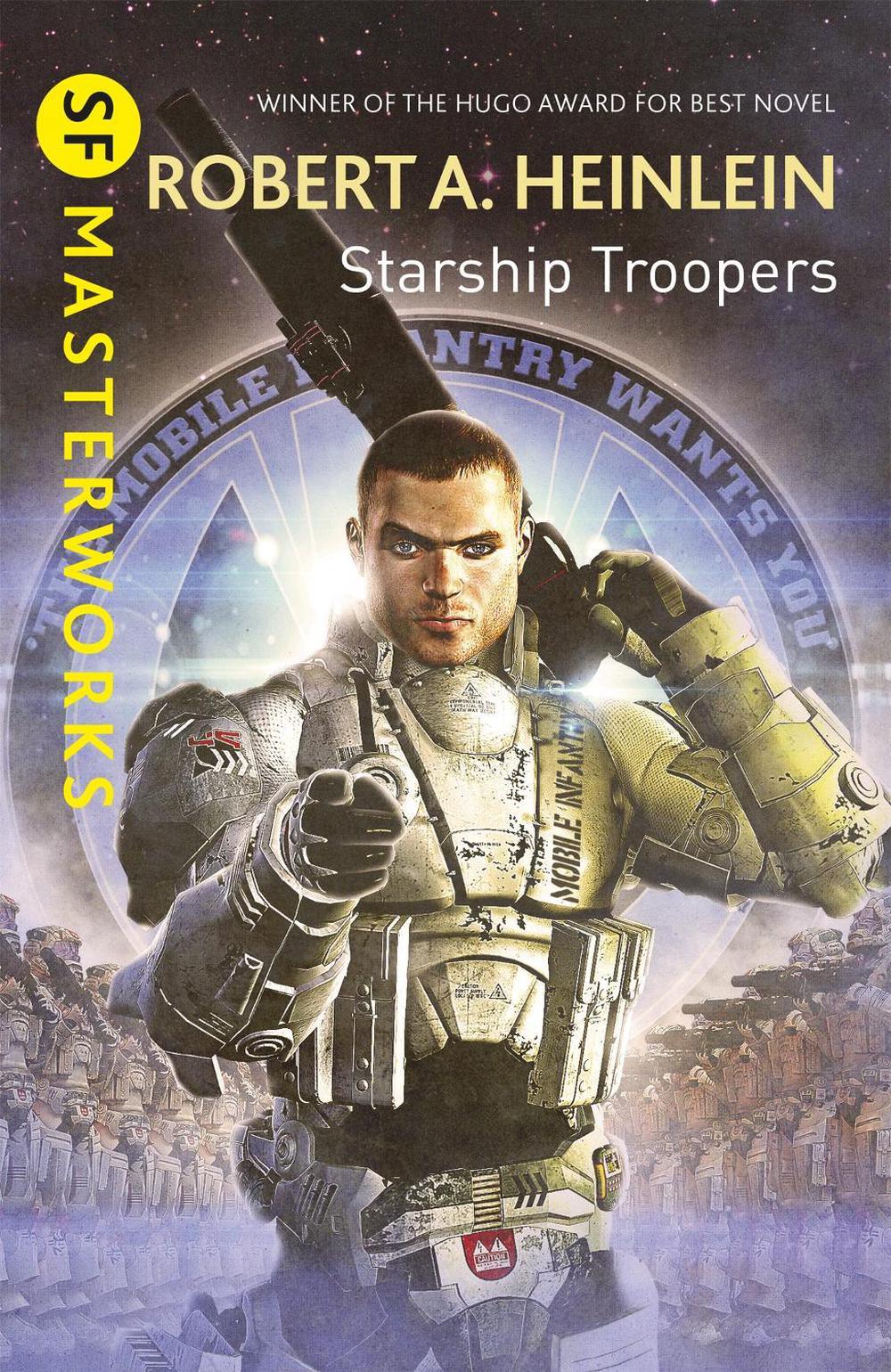Starship Troopers: Book vs. Movie – A Comparative Analysis

The 1959 science fiction novel Starship Troopers, penned by Robert A. Heinlein, stands as a landmark achievement in the genre, sparking both fervent praise and considerable controversy. Its influence extends far beyond its initial publication, shaping discussions on militarism, political philosophy, and the very nature of citizenship. However, the 1997 film adaptation, directed by Paul Verhoeven, took significant liberties with the source material, resulting in a work that, while visually stunning and critically acclaimed in its own right, presents a drastically different interpretation of Heinlein’s complex narrative. This article delves into the key differences between the book and the movie, exploring the themes, characters, and overall messages presented in each.
I. Books: Genre, Themes, and Literary Impact

Starship Troopers falls squarely within the military science fiction genre, though its exploration of political philosophy elevates it beyond simple action. Heinlein’s novel is a bildungsroman, tracing the maturation of Juan “Johnny” Rico from a naive young man to a hardened soldier and officer within the Terran Federation’s Mobile Infantry. This coming-of-age journey is intertwined with rigorous military training sequences, vividly detailed interstellar warfare against the Arachnid (“Bug”) species, and extensive philosophical debates within Rico’s history and moral philosophy classes. These classroom discussions serve as a platform for Heinlein to express his own socio-political viewpoints, which often take the form of didactic lectures delivered by Rico’s instructor, Jean Dubois.
A. Militarism and Political Ideology
One of the most contentious aspects of Starship Troopers is its depiction of a future society ruled by a military elite. In this futuristic Terran Federation, full citizenship, including the right to vote, is contingent upon completing Federal Service, most often military service. This system has drawn accusations of fascism and authoritarianism, with critics arguing that Heinlein glorifies the military and implicitly endorses a militaristic form of government. However, defenders of the novel argue that Heinlein was engaging in a thought experiment, exploring the ramifications of restricting suffrage to a specific group, specifically those who have demonstrated a commitment to the collective good through service. The novel’s ambiguity allows for varied interpretations, with readers grappling with the complexities of Heinlein’s presented political ideals. The book’s analogy between the human-Arachnid conflict and the Cold War adds another layer to the analysis, raising uncomfortable questions about the cost of maintaining a strong military and the potential for unchecked power.

B. Moral Philosophy and the Critique of Society
Dubois’s lectures, a significant portion of the novel, dissect the societal shortcomings of the 20th century, specifically criticizing a perceived lack of discipline and moral decay. Heinlein, through Dubois, advocates for harsh punishments, including corporal punishment and capital punishment, as a means of restoring order and civic virtue. This aspect of the novel is highly controversial, with many readers and critics finding it disturbing and at odds with modern sensibilities. The novel challenges the concept of inalienable rights, asserting that rights are earned through action and commitment, not simply bestowed. This challenge, underpinned by Dubois’s claims of mathematical demonstrability, firmly places the book within the “hard science fiction” subgenre. However, the use of irony and satire remains a subject of debate; some readers perceive a level of sarcasm, suggesting that Heinlein isn’t necessarily endorsing these views, while others see the endorsement as unequivocal.

C. Literary Influence and Adaptations
Starship Troopers’s influence on science fiction and popular culture is undeniable. Its depiction of powered exoskeletons, or powered armor, became a staple of the genre, impacting countless books, films, and video games. The novel’s portrayal of futuristic military technology and tactics has also been incredibly influential. The book’s lasting legacy, however, also resides in its controversial social and political philosophy. Authors and critics such as Ken MacLeod have recognized the novel as a pivotal text that has spurred ongoing dialogue and debate within science fiction concerning the role of the military in society. The 1997 film adaptation by Paul Verhoeven deliberately subverted many aspects of Heinlein’s vision, transforming the narrative into a satirical commentary on fascism, militarism, and propaganda. This divergence between the book and the film highlights the enduring power and multifaceted nature of Heinlein’s original work.
II. Authors: Robert A. Heinlein’s Biography and Writing Style
Robert A. Heinlein’s life significantly informed his writing. A graduate of the United States Naval Academy, Heinlein’s military experience is palpable in his works. He served in the Navy for five years before pursuing a writing career. This background strongly shaped his understanding of military structure, discipline, and the psychological impacts of warfare, all evident in his depictions of the Mobile Infantry in Starship Troopers. He became one of the most influential authors of “hard science fiction,” seamlessly integrating complex technical details with compelling narratives and philosophical explorations. His staunch anti-communist views, prevalent during the Cold War era, overtly influenced his political commentary in the novel and informed many of the book’s allegorical themes.
A. Heinlein’s Writing Style and Inspirations
Heinlein’s distinct writing style is characterized by its clear prose, concise sentences, and attention to scientific accuracy. His works often blend intricate details of technology and warfare with philosophical and moral reflections, often presented through his characters’ internal monologues and dialogues. This direct and sometimes didactic approach effectively conveys his complex social and political views while keeping the narrative engaging. Heinlein’s keen interest in history and political theory is evident in his works, often finding their way into the books’ narratives through discussions of the political systems in place, historical precedents and references, and societal structures, shaping his choice of themes and his method for weaving the ideas into the text itself.
B. Heinlein’s Political Views and the Controversy Surrounding Starship Troopers
The novel’s provocative themes and political views sparked immediate controversy upon its release and remain subjects of debate. Heinlein’s apparent glorification of the military, his views on punishment, and his conception of a society where citizenship is earned through service were considered controversial, leading to accusations of fascism and authoritarianism. The novel’s open expression of such strongly-held socio-political views prompted wide-ranging discussions and criticism, especially concerning the novel’s use of allegory, imagery, and character interactions to support his political ideals and critique of societal structures. The novel’s impact on the political conversation within science fiction is immense.
III. Reading and Learning: Educational Value and Life Lessons
Starship Troopers offers more than just science fiction thrills; it provides a framework for critical thinking and the examination of fundamental political and philosophical concepts. While the moral implications of Heinlein’s views are debatable, the book’s engagement with such substantial topics invites readers to analyze their implications. The novel’s educational value stems from its exploration of core principles such as suffrage, civic duty, morality, and the ethics of warfare.
A. Critical Thinking and Moral Ambiguity
The novel’s merit is also in its challenge to accepted notions of democracy and individual liberty, forcing readers to engage with complex and often uncomfortable questions concerning the role of government, the responsibilities of the citizenry, and the justification of warfare. The narrative’s inherent ambiguity surrounding the utopian aspects of the Terran Federation forces a critical examination of its inherent contradictions, compelling readers to critically assess the relationship between individual rights and societal stability. The seemingly idealized society, ruled by battle-hardened veterans, presents a sharp contrast to the horrors of war, thereby raising concerns over the potential for the normalization of violence.
B. Life Lessons and Social Commentary
Starship Troopers offers thought-provoking reflections on the nature of war, societal organization, and the complex relationship between individual liberty and societal duty. The novel’s critique of 1950’s American society, manifested through Dubois’s lectures and Rico’s experiences, serves as a warning against moral relativism and a call for civic responsibility. Although the specific details and methods of Heinlein’s call for better social structures are controversial, the book forces readers to contemplate the implications of their own actions and their contributions to a more ordered society, albeit in an often aggressive and militaristic manner. The novel’s exploration of identity and maturation through Rico’s experiences is another area of study, highlighting the impact of rigorous training and the consequences of accepting violence as a means to an end.
IV. Cultural Impact: Awards, Adaptations, and Communities
Starship Troopers garnered the Hugo Award for Best Novel in 1960, further cementing its importance within science fiction literature. The novel’s recognition as a classic and its influence on subsequent works in the genre are considerable. Despite the controversy, its impact remains indelible, driving ongoing conversations and analyses within literary criticism. The ongoing debate also encompasses the numerous film and video game adaptations, each with its unique interpretations and stylistic approaches, resulting in a rich spectrum of perspectives on Heinlein’s original work and its underlying themes.
A. The Hugo Award and Critical Acclaim
The Hugo Award win highlights the novel’s significant literary merit, despite its controversial aspects. The award underscores the book’s technical excellence, engaging plot, and thought-provoking themes. Even critics who disagree with Heinlein’s political viewpoints acknowledge his skill as a writer and the novel’s compelling presentation of its controversial ideas. The award’s significance lies in the acknowledgment of the book’s influence on subsequent science fiction and its enduring relevance as a cultural touchstone.
B. Film and Video Game Adaptations
Paul Verhoeven’s 1997 film adaptation deliberately diverged from Heinlein’s original work, presenting a satirical commentary on the themes of militarism and fascism. This intentional departure generated considerable discussion, demonstrating the book’s ability to inspire varied interpretations. The film’s success, while separate from Heinlein’s novel, nevertheless underscores the novel’s potent themes and their lasting relevance to contemporary audiences. Further adaptations, including sequels and video games, also contribute to the lasting cultural impact and the diversity of opinion and commentary that the book and its themes have inspired.
C. Online Communities and Ongoing Discussions
The ongoing discussion surrounding Starship Troopers, particularly the contrasting views on its political ideology and impact, has given rise to dedicated online communities such as those on Reddit, Lbibinders.org, and other forums. These spaces provide platforms for fans, scholars, and critics to exchange opinions, offer insights, and engage in lively debates about the novel’s enduring legacy. This continued dialogue highlights the novel’s staying power, its capacity for multiple interpretations, and its enduring relevance to questions concerning citizenship, liberty, and the role of violence in society. The rich online discussions contribute significantly to the ever-evolving interpretation and understanding of Starship Troopers.
In conclusion, Starship Troopers is more than just a military science fiction novel. It is a complex and challenging work that continues to provoke debate and inspire discussion regarding its myriad of themes and their implications. The significant differences between the book and the film adaptation illustrate the work’s multifaceted nature and its enduring power to inspire new interpretations and analysis decades after its initial publication. Its impact on science fiction, political discourse, and popular culture solidifies its place as a seminal work in the genre.